Akinwumi Adesina, the president of the African Development Bank Group (AfDB), has expressed disappointment over Nigeria’s persistent underdevelopment in numerous sectors.
Speaking during a lecture titled “Building a Global Nigeria,” which was delivered in Abuja in honor of Rtd. Gen. Yakubu Gowon’s 90th birthday, Adesina emphasized that, after 64 years of independence, Nigeria ought to have reached the status of a developed nation.
“At this point, 64 years post-independence, Nigeria should no longer be classified as a developing nation but should have joined the ranks of the world’s developed countries,” Adesina stated.
He further added that during his travels across Africa as the AfDB president, one recurring question from leaders is: “When will Nigeria truly develop?”
Adesina reminded the audience of the vision held by Nigeria’s founding fathers, who aspired for the country to be a beacon of hope not only for Africa but for the entire black race.
As the largest black nation in the world, Nigeria should embody the hopes and dreams of black people globally, Adesina remarked, stressing that many African leaders believe the continent’s rise is tied to Nigeria’s progress.
He compared Nigeria’s potential role to that of Saudi Arabia, which has driven the development of Gulf nations like the UAE, Qatar, and Kuwait, which have emerged as global powerhouses.
Adesina argued that for Africa to flourish, Nigeria must lead the charge by accelerating its own development. He warned that the country cannot continue to let the continent down, as it bears historical responsibility.
Drawing parallels from other regions, he explained how Germany, the UK, and France drove Europe’s growth, while China, Japan, and South Korea were key to Asia’s economic surge. Similarly, Nigeria must rise to lead Africa.
Adesina shared his vision of a brighter future for Nigeria but stressed that it must begin with eradicating poverty, especially in rural areas where millions have been neglected.
He highlighted the grim reality of poverty in Nigeria, citing a 2022 report from the National Bureau of Statistics (NBS) that revealed 133 million Nigerians—about 63% of the population—are living in multi-dimensional poverty.
He also noted that over half of the population still relies on dung, wood, or charcoal for cooking, a clear indicator of underdevelopment in energy access.
Adesina also linked Nigeria’s poverty to the rise of insecurity, drug abuse, and social unrest among the youth.
To combat these issues, he called for urgent efforts to restore security and stability across the nation, emphasizing the need for comprehensive reforms in education, healthcare, and youth employment.
Additionally, he urged leaders to address the growing number of out-of-school children, stressing that education must be prioritized to secure Nigeria’s future.
